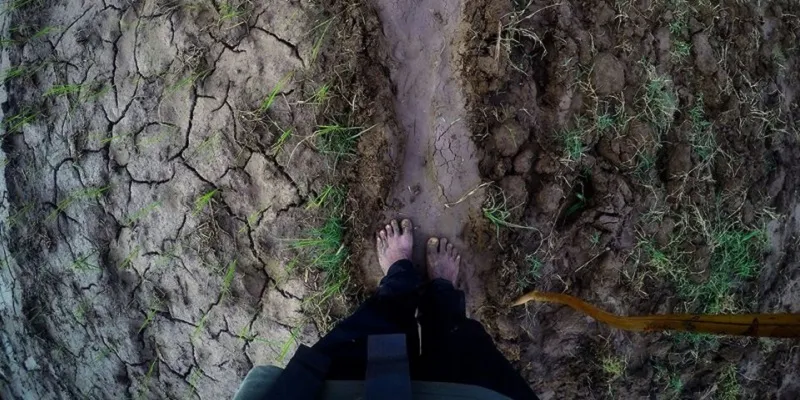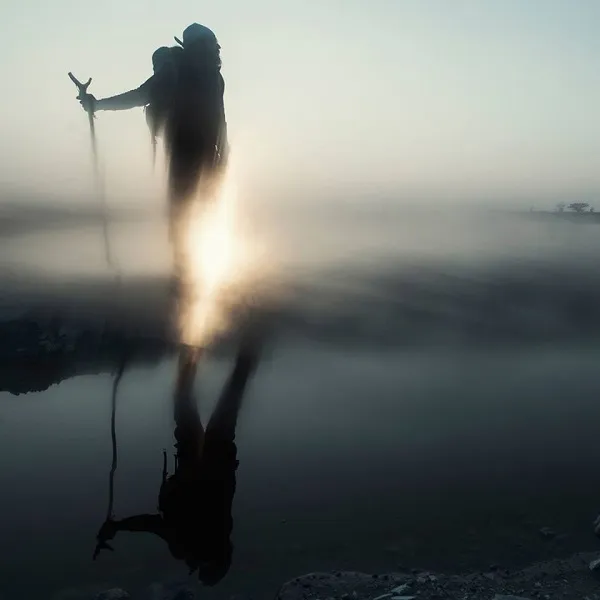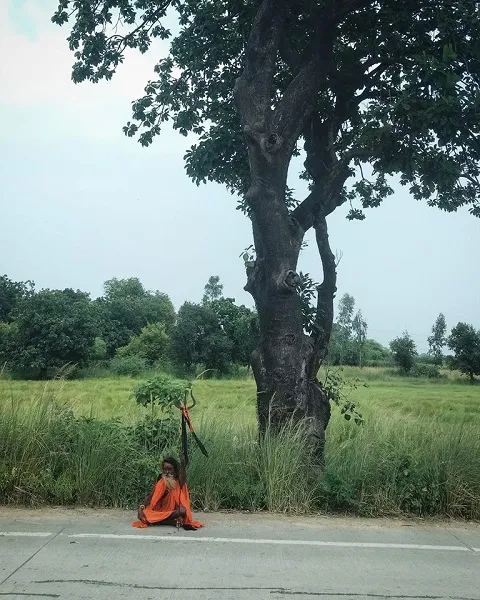Saddened by the state of the rivers in India, I sat out on a 3000km journey on foot to observe and capture the stories around the Ganga and what steps can we take to improve the health of our rivers...

Sitting in the middle of a vast farm tract while on this long walk along the Ganga, I registered a journal entry that read: 'Opportunities for work, stories and photographs are waiting everywhere, but these will not come to you on their own. You can either wait to stumble upon an accident that is to happen, or you can make these accidents happen; the choice is completely up to you', speaking to myself while trying to decide my immediate course of action. My choice, though, would only affect the type of story that I would encounter and not the probability of encountering one.
Every night spent in the outdoors was an open invitation to the mosquitoes for a party. We would stay up till late at night dancing with each other but once exhausted I would just lie on my sleeping mat or the cot provided by the villagers, staring into the night sky trying to identify stars and constellations while drenched in sweat because of the weather. It takes special skills to fall asleep in these conditions, but combined with the exhaustion of many kilometres of walking and carrying my own luggage it proved a little bit easier for me. The time before dawn would bring some breeze, making the last few hours of sleep peaceful and re-energising.
The concept of private space isn’t very real, especially if you’re an outsider sleeping in the open in a village in the middle of nowhere. Curious eyes fixated upon me, the sound of young giggling kids fascinated by my long hair and beard and comments about my ruck sack and mystical walking stick would greet me if I ended up sleeping beyond an hour from dawn. Accompanied by the overpowering smell of cattle dung and bellowing sounds, it made me shift from lazy to wide alert in the matter of a few seconds, while not forgetting to always smile back at the surrounding company. Curiosity isn’t a trait to frown upon, especially when that’s what took me there in the first place.
Depending upon the relationships forged the previous evening, it would take anywhere between a half hour to a half dozen before I could see myself moving out of the village, the luxury of time not on my side. At every step I would internally debate the possibility of reaching a discussion relevant to my field of interest—water—but sometimes I would just take a plunge in the opposite direction being the romantic at heart that I am. Often starting on an empty stomach, I would judge directions from the river’s flow, and if that wasn’t available then use my reliable compass to start moving upstream to more accidents and interactions.

Early mornings were when I would comfortably cover distances, taking advantage of the low sun and the general sense of camaraderie and goodwill among people in those early hours. I’ve never been a tea person but in the duration of this walk I succumbed to the habit, after incessant number of offers that poured in throughout the day. Served with a small portion of fried Indian snacks, smokes were always offered, both bidis (hand-rolled tobacco), and cannabis or ganja in chillum (earthen pipe). Conversation flowed freely over chai and samosa, as small gatherings formed around me, with questions pointing towards the rarity of spotting city folks in these areas; there was 'nothing to see here' after all. These conversations would often continue for hours, but the rising heat in the air sent reminders that I should continue with the walk, the afternoon heat in the plains being unforgiving.
The beautiful thing about being in a place that does not have an existing trail is that it sometimes sends you in the wrong direction, pugdundees vanish into nothingness, and you’re left alone to either turn around and retrace your path, or make a new trail through farmlands and forests, or just sit by the banks waiting for a farmer or fisherman to come by and help. It all definitely sounds exciting; that rush of adrenaline for adventure, the joy of defining a new path, the mental image of retelling the story in future enlarging that bubble of vanity within me, but there’s fear too, sometimes for life itself. The fear of poisonous animals, of bandits and robbers, of the land giving away while walking by the banks, and sometimes of losing consciousness because of hunger and dehydration.
My past experiences of cycling and walking across the country had deflated the balloons of fear, reinforced trust in people, and instituted a strong belief of mind over body, where I could push my body beyond what it thought was possible. So I would continue, treading constantly in the only direction I had to: forward. This is not to say that I was unaware of things that could go wrong, or that I had the solution for every possible outcome, but an adventure is never meant to work like clockwork, and the potential for improvisation is what makes one learn from the experience.
Walking through huge open fields, mahua and mango orchards, forests and grasslands, I would suddenly encounter a lone farmer or a group of children playing, or shepherds and cattle herders, each group as surprised to see me there as the other. One of the most common remarks in these situations—that is if a conversation happened at all, because children generally ran away and females would refuse to communicate—was that it was strange to see an Indian man who is not a sadhu undertake a task such as this. I would hear this everyday, for locals have seen plenty of foreigners pass through these areas attempting Herculean tasks, some on foot or bikes, and some paddling or rowing on the river, but rarely the average Indian. This would send a rush through my body, a boost to my ego, probably, but the joy of being one of the few explorers who have cared to take this route excited me.
People would often not believe that I’ve had my share of food, and then insist that I accept their offer for lunch, often ensuring I walk with them till their village and be audience to their stories. I would sometimes refuse even when on an empty stomach in order to not appear greedy, but they had their way of figuring it out, and would drag me with them anyway. They would say with utmost sincerity that it was their duty to ensure I was properly fed, and this was where the oft repeated Indian saying of 'Atithi Devo Bhava' (Guest is God) was truly played out. Surely the religious aspect of walking along the Goddess Ganga played a healthy part in these offers, but that does not give me the right to take away the credit that they deserve. Long conversations ensued, often around the topic of water and other social and local issues, deeply interconnected and showing trends over distances when I would study them later. Goodbyes here would generally be in the form of directions to the next village, offerings of farm fresh vegetables for the route or the invitation to rest a little longer, sometimes a request to stay on for a few days with them and just talk.
Locals shared stories of the many saints that traversed this route in search of salvation, to meditate by the banks, and of those who ended up creating small groups of followers in these places. Our country is dotted with legends and cults, so many that it would require extensive study to identify and document them all. Many would ask me, “What’s in it for you? Do you have a secret mantra for me?” and I would often not have an answer to give them, because my honest answers usually don’t make much sense to most people. It was slowly through the medium of this walk that the realisation dawned upon me that this journey, like many others in the past, was as much about me as it was about others, a fact I couldn’t deny, no matter how much I tried.

Dragging myself through the heat under the high afternoon sun I would have to choose between possibilities of taking the uneven unknown forest – farmland terrain by the banks, the brick-tar road at a little distance and the highway 5km away. It was in this phase one day that I made the journal entry that is mentioned at the start, following which I took the uncertain path and later spent that night under the stars with a gorgeous view of the flood plains.
As evening approached, I would begin to look for a suitable place to halt. Not carrying any camping equipment I relied completely on people’s grace to survive, a decision that usually paid off. It would be a bargain every day, between food and security, and the possibility of covering a few more kilometres. But there was no surety of finding a place, so I took the bargain on some days and played it safe at other times, each choice awarding me a new story. Excited conversations that would start with the need for details would turn serious and sometimes funny, connections being forged in the fires of a serendipitous meeting that lent a mystical flavor to the food prepared for dinner. By the time I had spent a couple of months on the field, I had been spoilt for farm fresh vegetables and dairy. When I finally lay down to sleep, the rendezvous would start again, the mosquitoes and their stings, the cattle and their bellowing sounds, the moon and new dreams.
This post has been written by Siddharth Agarwal, an adventurer and founder of Veditum.org. Go to www.veditum.org/crowdfunding to read more and contribute to help keep the project going. And write in to [email protected] to get in touch with Siddharth and team Veditum or to know more about sustainability initiatives.







